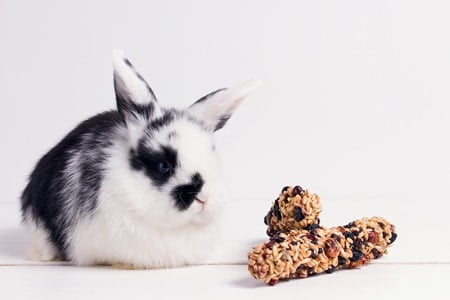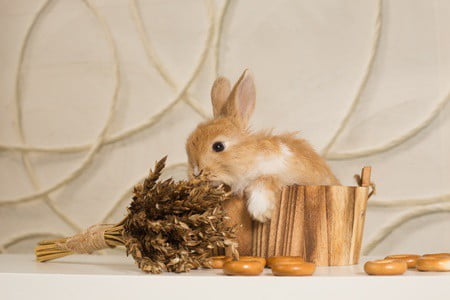Cereals refer to the edible parts of the grain. The most commonly cultivated cereal grains include wheat, corn, barley, rice, oats, millet, rye, and sorghum. Then we have processed cereals, such as frosted flakes, fruit loops, and Lucky Charms. But are any of these cereals safe for rabbits?
In very small quantities, unsweetened dry cereal is safe for most rabbits. In the wild, rabbits normally don’t eat large quantities of grain, except during certain seasons when fresh foliage is scarce. You should never feed cereal to rabbits that are under 12 weeks or obese due to their high carbohydrate content.
If your rabbit has digestive issues, avoid feeding them any type of grain treats, processed and unprocessed. Rabbits with digestive problems cannot digest and absorb the starch in their gut. Too much starch can lead to detrimental health issues such as GI stasis and enterotoxaemia.
Can I Feed My Rabbit Dry Cereals?
Dry cereal can be fed to rabbits. However, rabbits cannot eat cereal with milk, nor should they ever be given an entire bowl of cereal. There are some precursors to feeding rabbits dry cereal. These include:
- Rabbits should never be given dry cereal that is high in sugar. These include Fruit Loops, Lucky Charms, Frosted Flakes, Trix, granola, and Honey Bunches of Oats.
- You must avoid giving your rabbits dry cereal containing nuts. Nuts are high in fat and carbohydrates, which can lead to obesity, heart issues, indigestion issues, diarrhea, GI stasis, and enterotoxaemia.
Cereal treats that are considered safe for rabbits include:
- Rolled oats, bran flakes, or barley
- Minimally processed cereals
- Whole grain cereals without any sugar added (for e.g. Shredded Wheat, Rice Krispies, Corn Flakes, and Corn Chex)
- Dried whole-grain crackers

How Much Cereal Can a Rabbit Eat?
Cereals and grains are classified as treats for rabbits. Rabbit treats should be portion controlled to prevent unhealthy weight gain and health issues.
As long as your rabbit is healthy and is given a nutritionally-dense diet with high-quality grass hay, an occasional cereal treat will cause no harm.
In general, rabbits should not have more than ½ teaspoon of cereal treats per pound of their body weight per day.
If you’re not sure about the correct cereal portion size for your rabbit, the following table should help:
| Cereal Treat | Dwarf Rabbit (around 3 lbs.) | Average-sized Rabbit (around 6 lbs.) | Large Rabbit (10 lbs. or more) |
|---|---|---|---|
| Shredded Wheat | 1 piece | 2 pieces | 4 pieces |
| Cheerios | 3 pieces | 6 pieces | 10 pieces |
| Rice Crispies | 1 tsp. | 2 tsp. | 4 tsp. |
| Chex Types | 2 pieces | 4 pieces | 6 pieces |
Keep in mind that the above are occasional treats only. While it is okay to give a 3 lb. dwarf rabbit 1 piece of Shredded Wheat every day, it’s much healthier to add a variety of treats (such as pieces of fruit) rather than sticking to one kind.
Rabbits have sensitive digestive tracts that cannot process starchy and sugary foods. An overload of high-carbohydrate food in a rabbit’s system will quickly result in problems associated with poor digestion, such as loose stools, diarrhea, bloating, or tummy aches.
Consuming large volumes of grain-based foods also typically result in GI stasis and dysbiosis following indigestion in rabbits. Therefore, it’s best to keep cereal away from your rabbit if it frequently has digestive problems.
Can Rabbits Eat Oatmeal?
Oats come from oat grain, a cereal grass. Oats aren’t toxic for rabbits and can be given to rabbits as occasional grain treats.
However, don’t rush to fill your rabbit’s bowl with porridge, as oatmeal doesn’t come without health issues for rabbits.
Don’t Cook Oatmeal for Rabbits
Rabbits have different digestive tracts to humans. Therefore, it’s best not to feed them any type of cooked meals, including cooked oatmeal. However, a little bit will not cause your rabbit any harm.
It’s much better to feed your rabbit some raw rolled oats instead of regular oatmeal for two main reasons:
- Cooked oatmeal is easier to digest in a rabbit’s stomach. This raises insulin levels much faster, leading to weight gain and related issues. Cooked oatmeal is also more likely to cause digestive issues.
- You’re less likely to overfeed uncooked rolled oats.
Uncooked rolled oats require much more chewing than cooked oats, which can practically be swallowed without being processed in the mouth. Chewing allows rabbits to file their every-growing teeth and keep their dentition in great shape.
Moreover, raw oats are closer to what rabbits eat in the wild. According to Michigan State University, rabbits eat a variety of greens, grains, roots, and roughages to receive all the nutrients they need.
This is especially the case during dry or winter seasons when rabbits are less likely to find grass or leafy greens for sustenance.
Nutrients in Dry Cereal
| Cereal (½ cup, dry) | Fiber (g) | Protein (g) | Fat (g) | Carbohydrates (g) | Vitamins and Minerals |
|---|---|---|---|---|---|
| Cheerios | 1.5 | 1.5 | 1 | 10 | Vitamins A, B, C, & D Folate, Thiamin, Riboflavin, Niacin, Vitamin B6 & Vitamin B12 Calcium, Iron, Potassium & Zinc |
| Shredded Wheat (2 biscuits) | 6 | 5 | 1 | 38 | Vitamin D, Thiamin, Folate, Riboflavin & Niacin Iron, Calcium, Zinc, Phosphorus, and Magnesium |
| Rolled Oats | 4 | 5.9 | 3.6 | 28 | Ferulic acid, Iron, magnesium, vitamin B1, Zinc and Phosphorous |
| Bran Flakes | 4 | 2.1 | 0.48 | 18 | Vitamin A & C, Iron, Potassium and Calcium |
| Unsugared Cornflakes | 0.4 | 0.83 | 0.06 | 10.87 | Vitamin A & C, Iron, and Calcium |
Health Benefits of Cereal for Rabbits
Unsugared and unflavored dry cereal are acceptable treats for rabbits. The key is to practice portion control and mix them with other treats throughout the week.
Cereal is a decent source of protein, which is required for growth and development. It also has some fiber, which can help add bulk to the stool and improve your rabbit’s overall gut health. Dry cereal also provides:
- Vitamin A. Helps maintain healthy bones and teeth in rabbits, while boosting skin and eye health.
- Vitamin B-6. According to the Journal of Nutrition, a deficiency in vitamin B-6 can cause scaly skin, lower growth rate and contribute to mild anemia and convulsions. In severe cases, rabbits may also suffer from sudden paralytic collapse.
- Vitamin B-9 (Folic acid). A study in the Tohoku Journal of Experimental Medicine confirms that rabbits need folic acid for their health. Folic acid also lowers the risk of heart disease.
- Iron. Transports oxygen around the body, prevents anemia, and boosts metabolism in rabbits.
- Calcium. Promotes stronger bones and teeth.
- Potassium. Required for maximum growth.
- Phosphorous. It helps magnesium improve bone and teeth strength.
- Magnesium. Manages heart rate, helps rabbits sleep, and improves their muscle relaxation.
Further Considerations
Do not feed any grain treats or starchy foods to rabbits if they have or have had digestive problems. Rabbits with sensitive digestive tracts may suffer from bloating, tummy aches and diarrhea after consuming even a small portion of dry cereal. This can be uncomfortable for rabbits and may cause emotional stress and loss of appetite.
Furthermore, starch from cereal that hasn’t been digested in a poorly-functioning gut can pass into the cecum. The cecum carries helpful bacteria that aid in food digestion in rabbits.
However, if the food hasn’t been absorbed into the small intestine, it will be fermented by the bacteria, leading to gas, digestive obstruction, and even debilitating digestive conditions, such as enterotoxaemia.
Acute episodes of dysbiosis and GI stasis are also common after feeding large quantities of grain-based foods to rabbits.
If you do decide to feed grain-based foods to your rabbits, keep the following in mind:
- Do not feed grains to rabbits under 12 weeks.
- Do not feed grains to obese rabbits. A high-carbohydrate diet is a surefire way of causing quick weight gain in rabbits.
- Rabbits should never be fed more than ½ teaspoon of grain (or dry cereal) per pound of their body weight per day.
Problems with Cereal for Rabbits
Most commercially-sold cereals are saturated in sugar, preservatives, flavorings and unhealthy fat. Moreover, they’ve been so processed, that the most important nutrient for rabbits, fiber, get stripped off.
Commonly purchased cereals that are high in sugar, carbohydrates, and fats include Honey Nut Cheerios, honey bunches of oats, Fruit Loops, Lucky Charms, Raisin Bran, frosted flakes, Frosted Mini Wheats, among others. These cereals are not suitable for rabbits.
Cereals that are acceptable for rabbit use do not contain any added sugar and are higher in fiber. These include Rolled Oats, Bran Flakes, Cornflakes, Rice Krispies, Shredded Wheat, and Weetabix.
However, just because these cereals are safe for rabbit consumption, they’re not necessarily good for them.
Such cereals are treats that should only be fed in moderation because they don’t have much fiber or nutrients in them that can benefit a rabbit.
According to PETA, feeding rabbits muesli or processed cereal made with seeds, grains, pellets, peas or maize can lead to tooth and stomach issues. In the wild, rabbits rarely consume any grains, including legumes.
The RSPCA Victoria states that rabbits should not be fed any pet cereals, breakfast cereals, grains, seeds, nuts, corn, bread, biscuits or beans. When given uncontrollably, such foods can be toxic to rabbits.
Misleading Health Claims
It can be tempting to add packaged cereals into your rabbit’s diet. After all, they’re often marketed as healthy sources of fiber, minerals, and vitamins.
However, even breakfast cereals that are marketed as healthy with health claims such as “whole-grain” and “low-fat” contain sugar as their first-listed ingredients.
Keep in mind that small amounts of whole grains do not make such cereals healthy. Research published in the Cambridge University Press mentions how these health claims are effective ways of misleading the general public into believing these products are healthier.
The truth is that most packaged cereals lack the important fiber and protein required to boost rabbit health.
Granola and muesli may appear natural and healthy but they’re also spiked with sugar and fat to amplify their flavor. Raw rolled oats are a much healthier and safer alternative for rabbits.
Giving your rabbit a high-sugar breakfast cereal will spike its blood sugar and insulin levels, increasing its risk of obesity, heart disease, and related diseases.
Your best option will be to look for minimally processed breakfast cereals containing the least amount of sugar and the most fiber, protein and important vitamins and minerals required for rabbit health.

